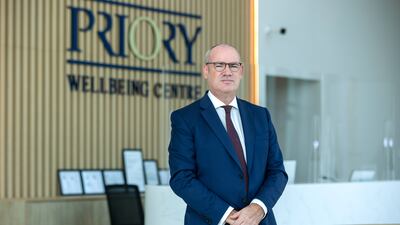A surge in demand for mental health support during the pandemic is abating as people begin to learn to live with Covid-19, UAE experts said.
Cases of depression, anxiety and other mental health issues rocketed around the world after the onset of the coronavirus outbreak, as many struggled to come to terms with changes to their daily lives caused by the virus, including travel restrictions, remote working and physical distancing rules.
That led to a growing need for mental health services over the past 18 months, with a second peak after the emergence of the highly-infectious delta variant earlier this year.
That has now dropped off, at least for adults, according to Priory, a UK mental health services provider, which operates two clinics in the UAE, in Dubai and Abu Dhabi.
Its branch in the capital opened last week, catering to adults and children.
“Because of the way the pandemic has been so well managed here, now people are going back to work we are seeing fewer things related to the pandemic,” said Will Goodwin, managing director of Priory Group Middle East.
“It could be that people are getting more used to living with the virus and therefore people are more likely to be able to go back to some of the things they did before, obviously following the guidelines.”
But pandemic-related requests for help have not stopped altogether, he said. Many ongoing issues relate to the realisation the virus is here to stay.
Long-term toll on children still to be determined
And the pandemic is a pressing concern in regards to services for children and young people.
“I don’t think we will fully understand for some time to come about the impact the pandemic has had on young people’s mental health,” said Tanya Dharamshi, clinical director and counsellor at Priory Wellbeing Centre Dubai.
“Going into online learning versus school, this in and out, in and out, having to create bubbles.
“There was the anxiety of not being able to go back to school and being almost in a silo, if you think of it like that.
“Up until the end of June, some schools were doing one week on, one week off. This is going to be telling in the sense of how children respond to that.”
The true effect will become clear in about a month or two, when all children in Dubai will return to full in-person learning, which has already resumed in Abu Dhabi.
“It will be interesting to see globally how this impacts the youth,” she said.
UAE's Priory team deliver dedicated service
Dubai is now Priory’s busiest clinic across the group, which operates 27 sites in the UK alone.
Part of that, Mr Goodwin said, relates to the availability of its experts in Dubai, who are employed directly by the clinic.
That from the UK, where specialists work across several locations, such as a hospital, as well as an outpatient clinic.
“So some of it would be availability. We have a very good team here, which is very accessible,” he said.
The conditions they see are similar to those in the UK, with anxiety, stress and depression, being the biggest.
“I would say the Dubai branch is slightly larger than those in the UK ... the Abu Dhabi branch, in particular, is over two floors in Al Bateen, Mr Goodwin said.
“It’s a wonderful facility and it’s probably our largest in the group.”
Gold-standard care at new Abu Dhabi centre

The expansion to Abu Dhabi was natural, he said.
It offers a full range adult, children and young person’s mental health services, including speech and language therapy and occupational therapy, as well as the diagnosis and treatment of disorders such as ADHD and autism.
“Probably the biggest differentiator is for people to be able to get assessments, developmental, educational and general mental health assessments.
“You are going to get a gold-standard assessment for ADHD, autism, developmental and educational assessment. But then you can also have the interventions to support in the same clinic.
“So we are bringing that best of British healthcare standards to the emirate.”
















